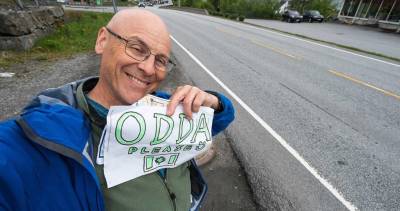Bon Voyage
Starring Isabelle Adjani, Gérard Depardieu, Virginie Ledoyen, and Yvan Attal. In French with English subtitles. Rated 14A.
Bon Voyage, a movie about movies more than anything else, has none of the preciousness that usually sinks self-referencing cinema. This consistently amusing film, set in 1940 France, strikes precisely the right balance between satire and melodrama, not easy for any director but handled with silken smoothness by Jean-Paul Rappeneau, a septuagenarian best known for directing 1990's Cyrano de Bergerac and writing Zazie Dans le Métro 30 years earlier.
His new script (fashioned with the aid of his son, Julien Rappeneau; Patrick Modiano, who worked on Lacombe Lucienne with Zazie director Louis Malle; and two others) tackles a still-touchy subject: the shot-free collapse of France's Third Republic in the face of Nazi invasion. And it manages to play this for farce by concentrating on the artificiality and self-absorption of all the main players.
The main performer (and she's never off for one second) is Viviane Denvert, a screen diva played with career-capping élan by Isabelle Adjani. The fact that, at almost 50, Adjani is supposed to be a woman almost 20 years younger is part of the fun; it's as if all Viviane's suitors see her through the same gauze used to filter her glowingly lit love scenes. The men under her spell include a klutzy French politician (Gérard Depardieu, looking surprisingly fit) who becomes increasingly handy as the Germans draw nearer; Frédéric (Grégori Derangíƒ ¨re) a handsome if unfocused young writer long in love with her; and Winckler (Peter Coyote, speaking solid French), a journalist who seems to be hiding something.
Oh, yes, there is one more fellow, but he's dead. In fact, his inconvenient demise in Viviane's luxury apartment is--along with those pesky Germans--what brings the other men together. It's also what connects Frédéric, by handcuffs, to Raoul (My Wife's an Actress star Yvan Attal), a roguish criminal whose resourcefulness and excellent timing make him an appealing alternative to the somewhat blander hero.
Frédéric is so smitten with his Cleopatra-like actor that he follows her to Bordeaux, where all the bigwigs head as Hitler approaches Paris. It's also where a displaced Jewish scientist (Jean-Marc Stehlé) and his bookish assistant, Camille (Virginie Ledoyen, so watch out when she takes off her glasses), have gone in a last-ditch attempt to get his explosive project into the hands of the British. Camille keeps running into Raoul and Frédéric along the way, setting off a sporadic rivalry, but she and her professor are almost the only parties here not easily distracted from the task at hand.
The expensive-looking film (all those old cars, Ingrid Bergman hats, and elaborate crowd scenes) is given extra sheen by Gabriel Yared's score, which skirts golden-era kitsch without sacrificing the quality of '30s-level composers. The director knows exactly when to pump up the action and when to let the moment rest on the kind of mood that gave the best French films of that period their ruminative qualities. (Rappeneau's last effort, 1995's absurdly overscaled The Horseman on the Roof, turns out to be a regrettable English-language diversion from an otherwise admirable career.) He also peppers the cast with such veterans as Aurore Clément and Edith Scob to remind us of his, and his film's, place in the still-flowing river of great French cinema.















Comments